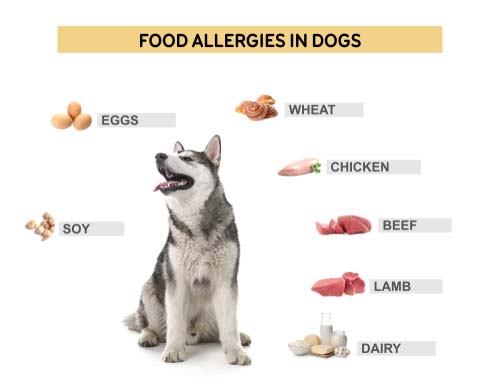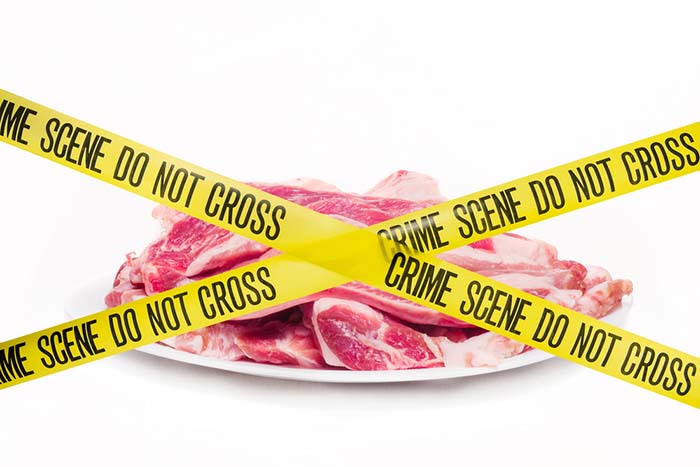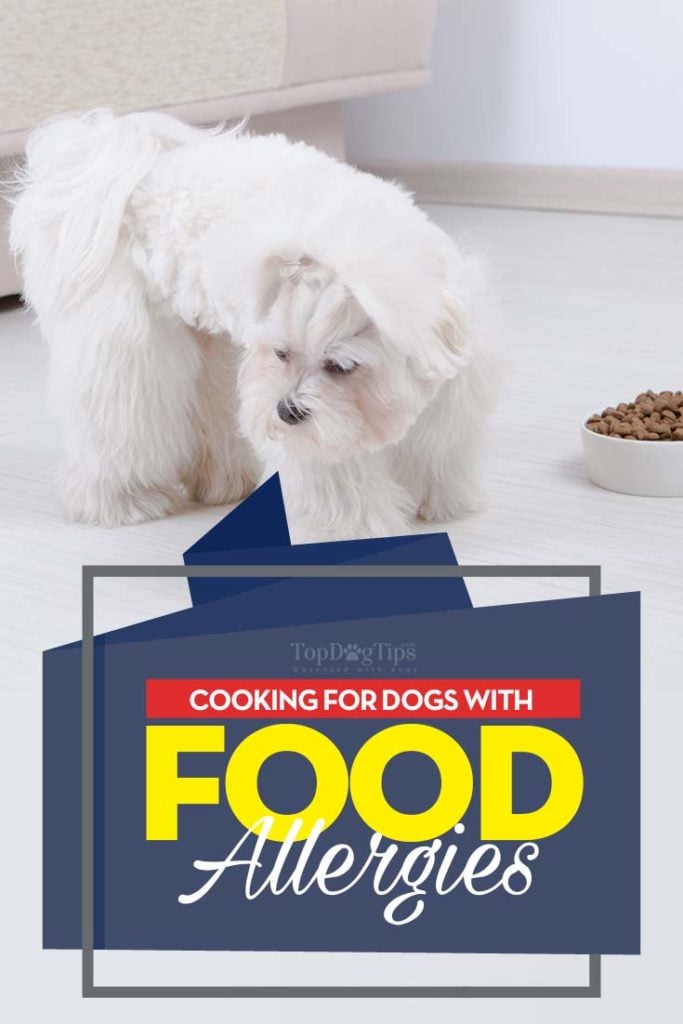Table of Contents
It is widespread for dogs to have dog food allergies (or food sensitivities), and it's one of the most typical hypersensitivities in dogs that pet owners must deal with.
Unfortunately, you cannot cure a dog's food allergy, but you can help manage it.
Still, it can be easily managed through avoidance and knowing how to feed dogs with food allergies.
The most difficult part of this process is figuring out what is causing an allergic reaction in the dog.
However, once the offending allergen (ingredient or ingredients) has been identified, it's fairly simple to develop a dietary plan for the dog that does not include that ingredient(s).
There is dog food for allergies and homemade recipes that can help.
Note that food allergies in dogs are not the same as food intolerance.
While food intolerance in dogs manifests itself mostly through symptoms like vomiting and diarrhea, a food allergy will also involve the dog's immune system.
It will cause itching, rashes, a variety of skin problems, and digestive problems.
This article covers feeding dogs with food allergies (food sensitivity) and not food intolerance.
What are Dog Food Allergies?
Dogs can suffer from allergies just like humans do, and while the incidence is still unknown, some studies show food allergies make up around 14% to 33% of all allergy cases in dogs (1).
After prolonged exposure to the allergen (a carbohydrate or a protein), a dog's immune system will begin fighting it by producing antibodies, which then cause the symptoms in the dog.
The most common signs of food allergy in a dog include (2):
- Itchy skin (and skin-related problems)
- Digestive problems (diarrhea and/or vomiting)
- Weight loss
- Hyperactivity
A dog's food allergy is a genetic issue, and it's triggered by exposure to the food or ingredient that the dog is inherently allergic to (3).
In addition to genetics, the environment can also play a certain role in developing food allergies. You cannot cure this problem, but you can manage it and navigate it fairly easily after diagnosing it.
The road to diagnosing a food allergy in a dog can be complicated (4, 5).
The first thing to do is to eliminate other possible allergies, like skin or blood allergies, which is done with simple commercial food tests using the elimination trial.
Studies show that the most common ingredients that cause food allergies in dogs are proteins – primarily beef, dairy products, chicken, lamb, fish, chicken eggs – followed by carbohydrates, such as corn, wheat, and soy (6).
A dog's breed or gender has no relation to food allergies.
All kinds of dogs, both female and male, and neutered/spayed and non-fixed dogs, have an equal probability of developing food allergies.
Symptoms of food allergies can appear any time throughout the dog's life, in puppies of 6 months and up to senior dogs of 12 years old (7).
Dog Food Allergies and Diet
The first thing to do if your dog has food allergies is to start with an elimination diet or a food sensitivity diet to determine which ingredient(s) is causing adverse reactions.
It would help if you took your pet dog off of all the food you're currently feeding them and put the dog on a limited ingredient diet with novel proteins that they've never eaten before (8).
Once the dog's food allergy symptoms subside, you can start gradually, one-by-one, introducing back old foods that you suspect have caused the problem.
If your dog reacts badly to one of those ingredients, you've found the culprit.
Some dogs are allergic to multiple foods, and to do this process properly, you should coordinate this with a vet.
It would help if you were not feeding the dog any treats while going through the elimination diet.
Since it takes around six weeks for allergens to leave a dog’s body, any foods other than those included in the sensitivity diet that you chose not only can harm the dog and bring the allergy back but will also mess with your identification of allergens.
Dog Foods for Allergies: Food and Skin
Consult with your veterinarian about the plan to rule out food sensitivities in your dog and which dog food for allergies to pick.
There are many variations of hypoallergenic dog foods to choose from, most of which will include rare ingredients that are less likely to cause allergic reactions in the dog (9).
Hypoallergenic dog food brands are actually very effective and can also be fed long-term if needed (10).
Not every hypoallergenic food will be ideal for every dog, so it's important to discuss this with your veterinarian. The three most popular formulations that show the best results are:
Novel protein diet – Novel protein dog foods usually contain a single source of protein in the form of some non-typical meat that your pet has never eaten before.
Some popular choices of novel proteins in dog food include salmon, buffalo, duck, or venison.
Since your dog never had this type of protein before, chances that he never developed an allergy to it are pretty high.
Hydrolyzed protein diet – This diet consists of proteins that have been broken down into small pieces of amino acids that make up the protein.
Since they are small, your canine’s body probably won’t notice the protein, allowing your dog to avoid an allergic reaction.
Most hypoallergenic dog food diets are made of hydrolyzed protein.
Therapeutic diet – This diet is basically a novel or hydrolyzed protein diet, but with higher levels of omega fatty acids because they can decrease the symptoms of food allergies.
You'll only be able to acquire this type of diet through your veterinarian, and these dog foods are usually the most expensive.
ASK A VET: Do Hypoallergenic Foods Really Work and Why?
Dietary Guidelines for Dogs with Food Allergies
Once you pinpoint the foods that cause your dog’s food allergies, you'll need to avoid those trigger ingredients.
They're not only going to be in dog food recipes, either. Look for these foods in your dog’s treats and medications, as well as anything else he ingests.
For example, some toothpaste made for dogs has chicken as an ingredient, and if your dog is allergic to chicken, this can cause an allergic reaction.
If your dog shows some symptoms of food allergies after you have eliminated the trigger food, that means that it might have another allergy.
It's not unusual for dogs to develop a new food-related allergy. Therefore, you might have to do the elimination diet again if that's the case and figure out what the new allergen is.
Pick commercial pet foods that are easy on your dog's stomach, and if you choose to cook for the dog (sometimes an easier approach), then make all meals easily digestible for the dog.
It's recommended to cook starchy vegetables and healthy, wholesome grains alongside novel proteins that you are sure your dog isn't sensitive to.
To make your dog’s digestion process easier, feed him more often in smaller meals.
Foods to Avoid
What foods you should avoid in your dog’s diet depends only and specifically on your individual dog and exactly what he is allergic to.
Every dog will have a different allergen causing this problem. Once the culprit has been diagnosed, that is the only thing you should avoid.
If the dog is allergic to multiple foods, then you should avoid them all.
Foods to Include
After you determine the foods that you should avoid, then find the best possible substitutions for them. There are many options out there, regardless of what your dog is allergic to.
Protein
If your dog is allergic to some of the common protein sources like chicken, lamb, beef, or fish, you can make a change to other protein sources.
Turkey, duck, rabbit, pork, venison, buffalo, and other exotic meats are all great substitutes for the protein source your dog is allergic to.
Eggs are also a good protein source, but animal-based proteins are better for your dog.
They are the best source of important amino acids necessary for growth, repair, and reproduction since they are the foundation for his organs, tissues, cells, and antibodies.
Carbohydrates
Even though carbohydrates are not nutritionally necessary for dogs, they are good for their intestinal health and provide your canine with energy.
Carbs are also a natural source of antioxidants, fiber, and trace minerals.
If your dog is allergic to grains like wheat and corn, you should substitute them with brown rice, barley or barley flour, rice flour, potato flour, or any other flour that is not made of corn and wheat.
Keep these to a very minimum, as your dog doesn't really need that many carbs, especially those with a high glycemic index.
Most fruits and vegetables are also rich in carbohydrates, like sweet potatoes, carrots, squash, pumpkin, apples, pears, etc.
They will be lower in calories and higher in fiber, which is why they should be your first choice for a source of carbs.
Vitamins and Minerals
Vitamins are important because they help your dog’s metabolism, while minerals are good for his bones and teeth.
These ingredients are found in many things, especially in vegetables and fruits like apples, pears, pumpkin, beet, carrots, turnip, green beans, broccoli, etc.
Dairy products are also rich in minerals. However, many dogs are allergic to dairy or even lactose intolerant, and if that is the case, you should stick to fruits and veggies.
As far as dairy goes, even if your dog is not allergic, you should stick to low-fat cheeses like cottage cheese.
The best source of minerals is organ meats, like the heart, liver, kidney, or lungs.
Fat
Fat is a great energy source, but it also protects your dog's organs and provides insulation.
Fats from sources like fish (salmon or sardines), fish oil, and flax-seed oil are also rich in essential fatty acids like omega-3, which are extremely important for healing purposes and their anti-inflammatory properties.
Other good fat sources can be meats, poultry, eggs, pumpkin seed oil, and soybean oil.
Probiotics
Probiotics are great for your dog’s digestive system, and they can help him with his food allergies as well.
Studies have shown probiotics help with many allergic reactions in humans, but there are no trials with dogs yet.
You can use probiotic supplements or just put a couple of teaspoons of yogurt in your dog’s meal to help him with digestion.
Homemade Dog Food for Allergies
Making your own food from scratch is the safest way to ensure that your dog is protected from foods that trigger his food allergy.
Many commercial foods are made from ingredients that are themselves made from other ingredients. For example, corn is used in many commercial foods in one form or another.
However, if you haven’t cooked for your dog before you switch to a homemade diet, you should talk to your vet or an animal nutritionist to ensure that your diet is well-balanced and nutritional enough.
Here are a couple of video examples of homemade dog food for allergies:
Chicken and Carrot Meal
There are two reasons this recipe is recommended for dogs with food hypersensitivity.
First, the main protein source – in this case, chicken – is generally just a placeholder for whatever other protein you may need to use instead, and it's easy to make the substitution.
Second, this meal is straightforward to make, so if you are starting to cook for your dog, you might want to consider this recipe.
It is also great for his digestive tract because it has potatoes and carrots, full of fiber, to help his digestion.
Ingredients
- 1 1/2 tablespoon of cottage cheese
- 1/2 pound of fried, ground chicken
- ½ cup of grated carrots
- 1 cup of mashed potatoes
Preparation
Mix carrots, mashed potatoes, and chicken in a pot until all the ingredients are distributed evenly.
Then put them in the microwave oven and heat them for 3-4 minutes. After the mix cools off, add cottage cheese and serve it to your dog.
Remember that you can always substitute any ingredient from the recipe if your dog is allergic to it.
If your dog is allergic to chicken, use different meat, like turkey or duck. If he is allergic to dairy, don’t use cottage cheese or any cheese at all. Your dog will still love this recipe.
MORE RECIPES: 12 Homemade Dog Food Recipes for Dogs with Allergies
Best Hypoallergenic Dog Foods for Food Allergies
While every dog will have a unique allergy to a specific food, veterinarians have noticed trends in most common ingredients causing food hypersensitivity in dogs.
Based on the available data, hypoallergenic dog foods, most of which are least likely to cause allergic reactions in dogs, have been developed.
Here are some of the best brands currently available over the counter:
| Preview | Product | Rating | |
|---|---|---|---|

|
Wellness Natural Pet Food Wellness Simple Natural... | 2,468 Reviews | Check Price |

|
Ps for Dogs 100% Hypoallergenic Dog Food - No More... | 684 Reviews | Check Price |

|
Purina Pro Plan Sensitive Skin and Stomach Dog... | 23,135 Reviews | Check Price |

|
Hill's Pet Nutrition Science Diet Dry Dog Food,... | 18,169 Reviews | Check Price |
What to Do About Dog Food Allergies Going Forward
So we have covered a lot. Dog food allergies are pretty common, but fortunately, they can be managed.
After reading we hope you feel better now that we've also gone over the most common food allergies in dogs and how to combat it.
In the comments below, let us know if you have a dog that suffers from a chicken allergy or other allergies!
We would love to try to help more if we can!
Disclosure: We may earn affiliate commissions at no cost to you from the links on this page. This did not affect our assessment of products. Read more here and find full disclosure here.
Want to share this?
















